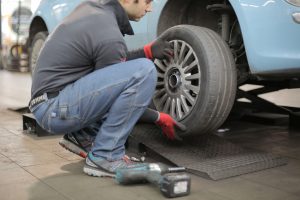Published on: 04/12/2020
With the imminent arrival of the new year, it’s important to get your vehicle ready for the New Year – but what steps can you take to ensure you’re motoring happy over the next 12 months? The Trust My Garage blog is here to help! Read on to find out what you need to know.

MOT
The last few years have been an unprecedented experience for almost everyone, including motorists. For safety, the DVSA began to issue six-month MOT extensions for vehicles due an MOT between April and the end of July in 2020. The extension means that many vehicles due their MOT over the summer will now been condensed into the last few month of 2020, creating much longer waiting times for MOT appointments.
The extension was entirely optional, and you were still able take your vehicle to your local Trust My Garage member garage at its normal MOT time, which is usually in line with its registration, if you want to do so. This may be helpful if your key dates, such as MOT, tax renewal and insurance renewal, are due at the same time, as it will be easier to remember.
The DVSA have predicted a 24 per cent increase in demand for MOT’s in December and a 45 per cent increase in January, so a great way to prepare for the New Year is to ensure your test is booked in plenty of time ready for its due date and avoid your car being unusable due to an expired MOT.
To check when your vehicle’s MOT test is due, you can visit https://.gov.uk/check-mot-history. All you need is your vehicle’s registration number!
Tax
About a month before your road tax expires the DVLA will issue you with a V11 Vehicle Tax Reminder, containing the information you need to either renew your tax online, via telephone or at a Post Office branch. Your V11 will also tell you the date your current road tax period will expire.
You can check the status of your road tax or renew it online via the Gov.uk website. Driving without road tax will result in a DVLA-imposed fine of £80, which can be reduced by half if paid in 28 days. However, it could result in a fine of up to £1,000 or five times the annual road tax fee if the case goes to court. Even if your vehicle is not being driven but is parked on a public road, if you’ve forgotten to pay tax, it could be clamped or even impounded!

Insurance
It’s illegal to drive a vehicle on a road or in a public place without at least 3rd party insurance – and even if the vehicle itself is insured, if you’re not correctly insured to drive it you could get penalised. The police could give you a fixed penalty of £300 and 6 penalty points if you’re caught driving a vehicle you’re not insured to drive.
If the case goes to court you could get :
- an unlimited fine
- disqualified from driving
The police also have the power to seize, and in some cases, destroy the vehicle that’s being driven uninsured. You can check your vehicle insurance renewal date with your insurance provider, and you can do a quick check on whether your vehicle is insured here: https://ownvehicle.askmid.com/
Car maintenance
It’s important to make sure your vehicle is running at its best ready for the next year, so take time to ensure your motor isn’t displaying any warning lights on the dashboard, your fluid levels are topped up as needed and your lights are working clearly with no damaged or broken bulbs.
Our “What to do when… your vehicle needs some TLC” post covers the basics you need, in detail, to make sure you’re driving into 2021 with all cylinders firing.
The other posts in our ‘What to do when…’ series can also provide some further tips and insight across many areas of motoring and vehicle maintenance to help you ensure your motor is running at its best! You can check out our posts in the series here.

Tyres
The tread of a tyre refers to the rubber on its circumference that makes contact with the road or ground. The legal limit for minimum tread depth in the UK is 1.6mm across the central three-quarters, however it is recommended to keep your tyres at 3mm or above for optimum grip. Drivers who fail to comply with the regulations face a fine of up to £2,500 and three penalty points for each illegal tyre.
The ‘20p test’ is a quick way to check the tread depth. Place a 20p coin into the main tread grooves at three points across the tyre and then repeat around its circumference. If the outer band of the 20p piece is visible, the tyres may be unsafe or illegal and need to be checked by a professional garage or tyre specialist.
You can check and correct your tyre pressure at most UK petrol stations using a pay-per-use air and water station, or you can purchase your own tyre pressure gauge – the choice is yours.

If you aren’t sure what pressure is correct for your vehicle’s tyres you can refer to your Owner’s Manual. Details should be provided in either/both BAR and PSI, and you can adjust your pressures to the recommended figure. Often a vehicle’s tyre pressure information is also provided on the interior frame of the front passenger or driver’s door, and sometimes inside the fuel flap, so be sure to check there if you need a quick reference point as well.
Finding a local garage
If you’re looking for a professional local garage to help you, you can find a local CTSI approved Trust My Garage member by visiting the Trust My Garage website’s ‘Find a Garage’ map! You can even read reviews from other motorists about the members in your area to help you decide which garage is right for you.
More about Trust My Garage
Trust My Garage is a collection of Britain’s trusted local garages – each one different and all dedicated to the highest standards of skill and personal service.

Every garage in Trust My Garage are members of the Independent Garage Association, which is part of the RMI, one of Britain’s oldest motor trade organisations. IGA members are true professionals who have to comply with a strict code of practice.
Each and every customer of all Trust My Garage members can rely on using a nationally recognised brand to help you and your vehicle get the best value service for you and your vehicle.

Leave a Reply